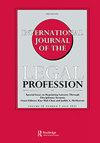Judicial recruitment in post-communist context: informal dynamics and façade reforms
IF 0.9
Q2 LAW
International Journal of the Legal Profession
Pub Date : 2020-06-04
DOI:10.1080/09695958.2020.1776128
引用次数: 2
Abstract
ABSTRACT This article focuses on judicial recruitment in post-communist countries and highlights gaps between law and practice which are due to intervening informal dynamics. The case study on Georgia is suitable to explore the power of informality in increasingly formalized systems of decision-making and also in the ones that allocate considerable powers to judges. The article draws inspiration from and contributes to the limited but growing scholarship on informality in judicial governance. It relies on extensive empirical research to discern informal criteria and methods for selecting judges which embody the interests and preferences of the judicial elite and turn elaborate formal rules and procedures into the convenient façade that covers up informal dealings. It signals that recruitment mechanisms, even if structured to eliminate independence-threatening dynamics, can emerge as means of perpetuating the mentality of conformity and help prevent the consolidation of counter-elites willing and able to challenge the dominance of the incumbent leadership.后共产主义背景下的司法招聘:非正式动态与公平改革
摘要本文主要关注后共产主义国家的司法招聘,并强调了由于干预非正式动态而导致的法律与实践之间的差距。对格鲁吉亚的案例研究适合于探讨非正式性在日益正式的决策系统以及在将相当大的权力分配给法官的决策系统中的力量。本文从有限但日益增长的关于司法治理非正式性的学术研究中得到启发和贡献。它依靠广泛的实证研究来辨别选拔法官的非正式标准和方法,这些标准和方法体现了司法精英的利益和偏好,并将精心制定的正式规则和程序变成了掩盖非正式交易的便利幌子。这表明,招聘机制,即使是为了消除威胁独立的动力,也可以成为延续从一而三心态的手段,并有助于防止愿意和能够挑战现任领导层统治地位的反精英的巩固。
本文章由计算机程序翻译,如有差异,请以英文原文为准。
求助全文
约1分钟内获得全文
求助全文

 求助内容:
求助内容: 应助结果提醒方式:
应助结果提醒方式:


